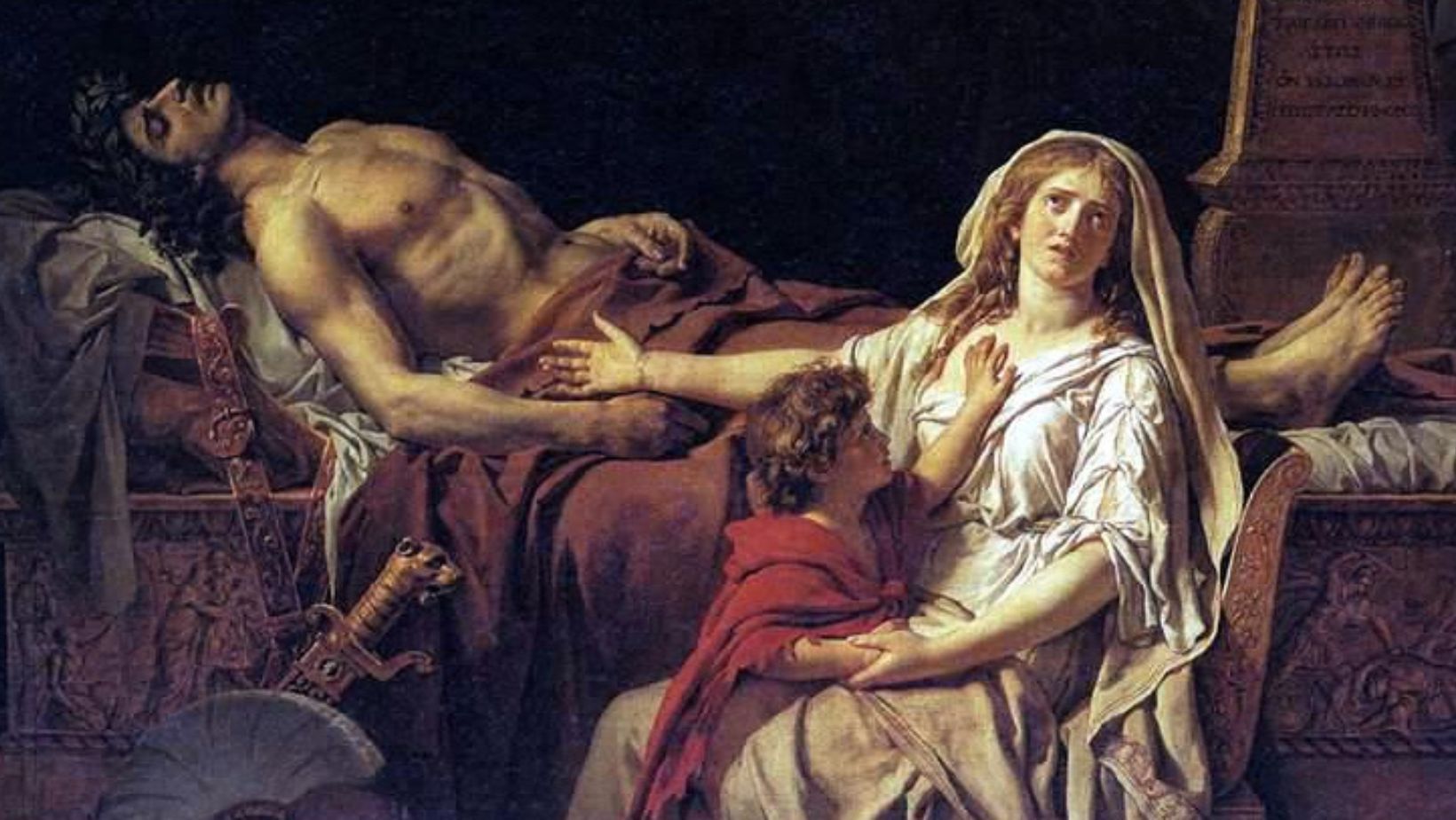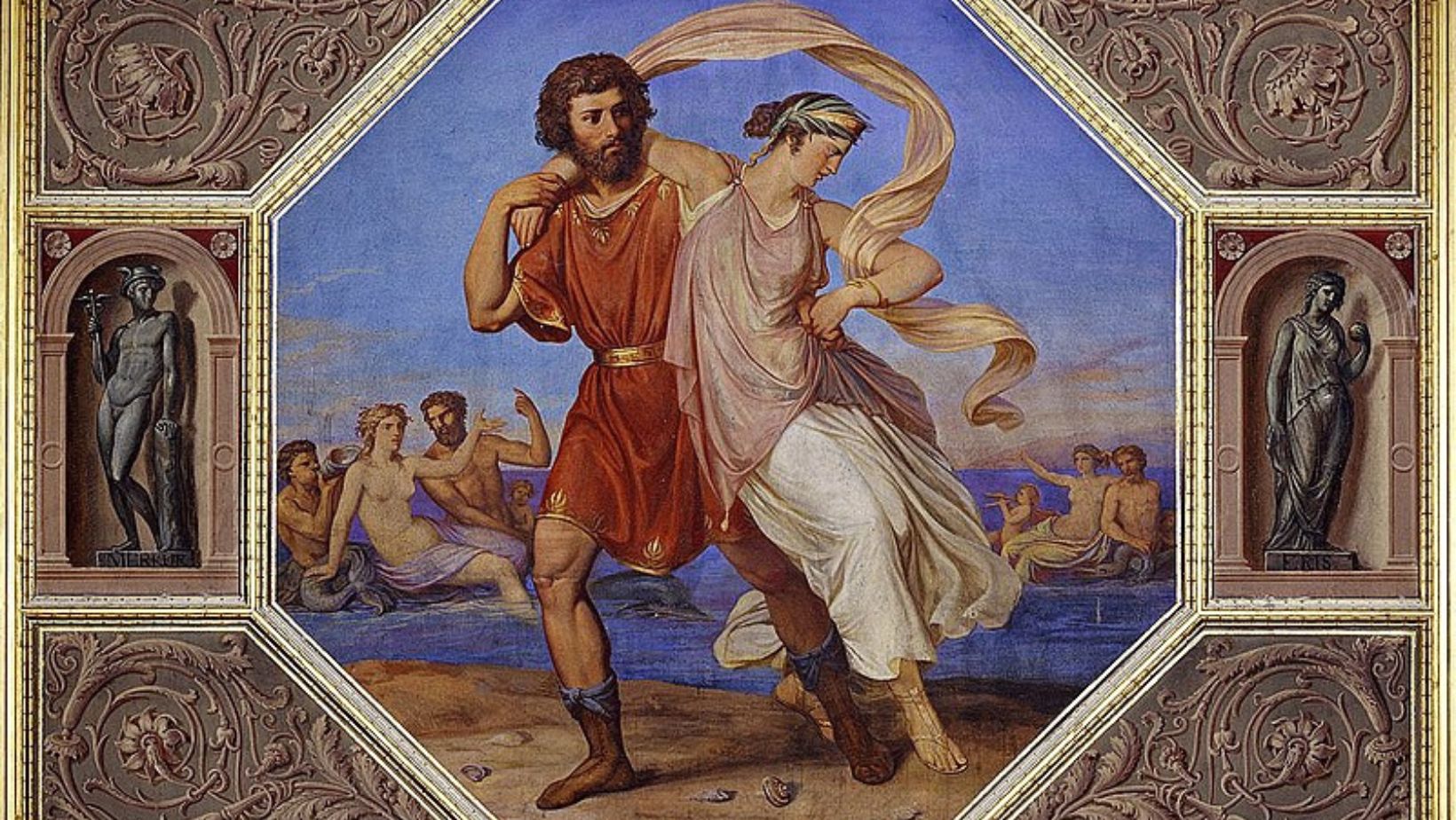At first glance, Euripides’ Andromache might seem like another ancient text disconnected from today’s world. Yet, delve a bit deeper and you’ll find it brimming with themes that resonate just as powerfully now as they did over two millennia ago. Written between 428 and 425 BC during a time of great upheaval for Athens, this play offers more than just a glimpse into the past; it presents timeless questions about war, loyalty, and survival.
The tale of Andromache, once queen but now reduced to slavery after the Trojan War, challenges us to consider the fates intertwined by victory and defeat. As we explore her struggles within Neoptolemus’ household—a battlefield far removed from Troy’s walls—we’re invited to reflect on our own notions of justice and mercy.
Table of Contents:
- Overview of Euripides’ Andromache
- Andromache’s Plight as a War Captive
- Conflict with Hermione and Menelaus
- Peleus’ Intervention and Neoptolemus’ Fate
- Resolution and Divine Intervention
- Conclusion
Overview of Euripides’ Andromache

Euripides’ Andromache is a Greek tragedy that’s stood the test of time.
One of only 19 surviving plays out of the 92 he wrote, it’s a compelling look at the aftermath of the Trojan War through the eyes of Hector’s widow, the title character Andromache.
Date and Historical Background
While the exact date of the play’s first performance is unknown, scholars generally place it sometime between 428 and 425 BCE.
This was during the height of the Peloponnesian War between Athens and Sparta, which likely influenced Euripides’ negative portrayal of Spartan characters like Menelaus.
Characters and Setting: Euripides’ Andromache
The play is set in the Greek city of Phthia, in the household of Neoptolemus (son of Achilles).
The main characters are:
- Andromache, former princess of Troy, now living as a slave
- Hermione, daughter of Menelaus, and Helen, wife of Neoptolemus
- Menelaus, king of Sparta
- Peleus, father of Achilles
Summary of the Play
Andromache, a Trojan woman now enslaved in Greece, faces cruelty from her master Neoptolemus’s jealous wife, Hermione.
Fearing for her life and that of the son she bore Neoptolemus, Andromache seeks refuge at a shrine of Thetis while Neoptolemus is away.
Hermione, with the help of her father Menelaus, plots to kill Andromache and her child.
But after a series of confrontations and revelations, the goddess Thetis appears and sets things right, prophesying an escape for Andromache and her son and foretelling the fates of the other characters.
Andromache’s Plight as a War Captive: Euripides’ Andromache
As a war spoil from Troy, Andromache embodies the suffering of women in wartime.
Once a princess, now a slave, her story is a tragic one.
Andromache is living as a slave in the household of Neoptolemus, the Greek warrior who killed her husband Hector in the Trojan War.
She’s borne Neoptolemus a son, but has no real status or protection.
As a foreign woman and a slave, she’s powerless and vulnerable.
Threat to Andromache and Her Son
Hermione, the daughter of the Spartan king Menelaus and Helen of Troy, is Neoptolemus’ wife.
Jealous of Andromache, she plots with her father to kill her and her young son while Neoptolemus is away.
Andromache’s son, though fathered by a Greek hero, is just as much a target as she is. They’re both seen as a threat.
Andromache’s Loyalty to Hector: Euripides’ Andromache
Despite her enslavement and the son she’s borne to her new master, Andromache remains loyal to the memory of her slain husband Hector.
She laments his death at the hands of Achilles and her cruel fate as a captive.
Her love for Hector humanizes her and makes her a deeply sympathetic figure, even amid enemies.
Conflict with Hermione and Menelaus: Euripides’ Andromache
The driving conflict of the play is between Andromache and her master’s wife and father-in-law.
Hermione and Menelaus are ruthless in their persecution of Andromache, showing the corruption and cruelty of those in power.
Hermione is fiercely jealous of Andromache, fearing she’ll replace her in Neoptolemus’ affections.
She accuses Andromache of using witchcraft to make her barren and turn her husband against her.
Hermione’s irrational jealousy and willingness to kill reveal her as petty and villainous.
Menelaus’ Intervention
Menelaus, the Spartan king, arrives to help his daughter deal with Andromache.
He’s portrayed as a bully and a coward, eager to kill a defenseless woman and child.
Together, he and Hermione plot to murder Andromache and her son while Neoptolemus is away, revealing their lack of honor.
Andromache’s Defenselessness: Euripides’ Andromache
As a slave woman with no one to protect her, Andromache is at the mercy of her cruel mistress and the Spartan king.
She seeks sanctuary at the altar of Thetis but is eventually dragged away to face her fate.
Her speeches reveal her cleverness and courage but also her vulnerability in a world where women are powerless pawns.
Key Takeaway: Euripides’ Andromache
Euripides’ Andromache gives us a heart-wrenching view of war’s aftermath. It focuses on Hector’s widow, enslaved and struggling against her cruel fate in a foreign land. This tragedy from ancient Greece reveals timeless themes of power, jealousy, and the resilience of the human spirit.
Peleus’ Intervention and Neoptolemus’ Fate: Euripides’ Andromache

When all hope seems lost for Andromache and her son, a hero arrives on the scene: Peleus, Achilles’ father and Neoptolemus’ grandfather.
The aged king rushes in, demanding to know what’s causing such an uproar at the palace.
Peleus wastes no time in confronting Menelaus about his secret, lawless schemes. He orders him to stop this murder at once.
In a heated exchange, Peleus calls out Menelaus for his cowardice during the Trojan War. He accuses him of leaving his house unguarded, allowing his wife Helen to run off with Paris.
Peleus even suggests that Menelaus should have been happy to be rid of such a shameful wife.
But Menelaus fires back, claiming that whatever a man holds dear is more valuable than the conquest of Troy itself. He argues that he has every right to manage his own affairs, including helping his daughter regain her rights as a married woman.
The two engage in a battle of words, trading barbs and insults. Peleus emerges victorious, untying Andromache and the child and sending Menelaus on his way.
News of Neoptolemus’ Death: Euripides’ Andromache
But there’s little time to celebrate. A messenger soon arrives with devastating news: Neoptolemus has been killed at Delphi.
The messenger reveals that Orestes, Hermione’s former fiancé, likely orchestrated the murder. Neoptolemus was struck down by a band of armed men while visiting the oracle of Apollo.
Peleus’ Grief and Anger
Peleus is shattered by the loss of his grandson. As a father himself, he knows the pain of outliving a child all too well.
His grief quickly turns to anger as he vows to avenge Neoptolemus’ death. In Peleus’ eyes, Orestes is nothing more than a cowardly murderer, striking from the shadows.
The once-mighty king seems to age before our eyes, weighted down by this new tragedy. But even in his sorrow, Peleus remains determined to seek justice for his fallen grandson.
Resolution and Divine Intervention: Euripides’ Andromache
With Neoptolemus dead and Peleus drowning in grief, all seems lost. But the gods have other plans in store.
Suddenly, a divine figure appears in the sky above Thetis, the sea goddess and mother of Achilles.
Thetis descends from the heavens to bring resolution and prophecy to the characters below. Her appearance is a literal “deus ex machina,” a god from the machine, a common plot device in Greek tragedy.
Prophecies and Instructions
Speaking to Peleus, Thetis reveals the fate that awaits each character. She declares that Andromache and her son will escape death and go on to found a new dynasty in Molossia.
As for Peleus himself, Thetis has a special reward in mind. She will make him immortal, freeing him from the mortal world’s woes. He will join her in the realm of the gods, living eternally by her side.
Thetis also gives instructions for the proper burial of Neoptolemus. Even in death, the fallen warrior will be honored as a hero.
Reconciliation and Future of Characters: Euripides’ Andromache
With the goddess’ prophecies revealed, a sense of closure descends upon the characters. Each accepts the destiny that fate and the gods have determined.
Andromache is spared a tragic end, with the promise of a new life and a royal lineage ahead of her. Her son, once destined for sacrifice, will now be the founder of kings.
Peleus, meanwhile, is granted an escape from the suffering he has endured. While the loss of his grandson still weighs heavy, he can take comfort in knowing that eternal peace awaits him in the realm of the gods.
The play ends with a sense of reconciliation as the mortal characters submit to the gods’ will. The cycle of tragedy and revenge, so common in Greek drama, is finally broken by divine intervention.
Through Thetis’ appearance and prophecy, order is restored, and each character’s future is laid out. The living are spared, the dead are honored, and the gods have the final say.
It’s a poignant reminder of the power of fate and the gods in ancient Greek theater. No matter how much mortals strive and struggle, the gods ultimately decide their destiny.
Key Takeaway: Euripides’ Andromache
When all seems lost for Andromache and her son, Peleus steps in, challenging Menelaus and saving them. But joy turns to sorrow with Neoptolemus’ death. Yet, Thetis’ divine intervention promises new beginnings and eternal peace for some, showing the gods’ ultimate control over fate.
Conclusion: Euripides’ Andromache
Through exploring Euripides’ Andromache, what becomes clear is not just an account of antiquity’s woes but rather a mirror reflecting back at us enduring human concerns. The story elegantly traverses through sorrowful memories while still holding onto glimmers of hope for redemption amidst despair.
In our day-to-day lives, where conflicts may not be waged with spears or chariots but with words and ideologies—the essence captured within these ancient lines remains profoundly relevant. It subtly shifts our everyday experiences by encouraging empathy towards those who have endured unimaginable losses yet continue striving for dignity against all odds.
This isn’t merely about revisiting history; it’s recognizing that beneath the layers of mythological figures lies core truths about humanity’s capacity for resilience.
And so, Euripides’ Andromache tells us stories woven from threads both ancient and undeniably contemporary, highlighting how tales forged in tragedy can illuminate pathways toward better understanding ourselves amid life’s unending trials.

